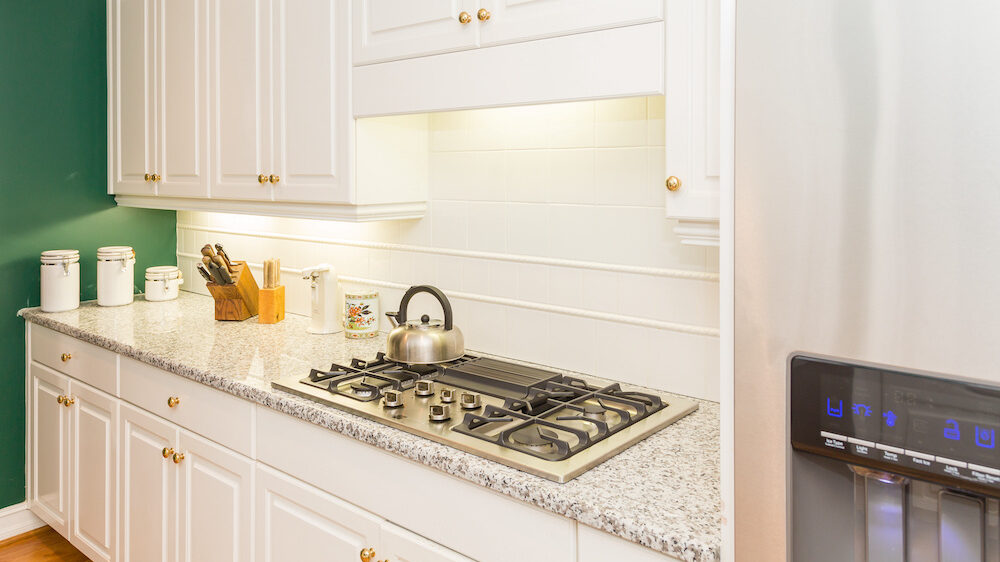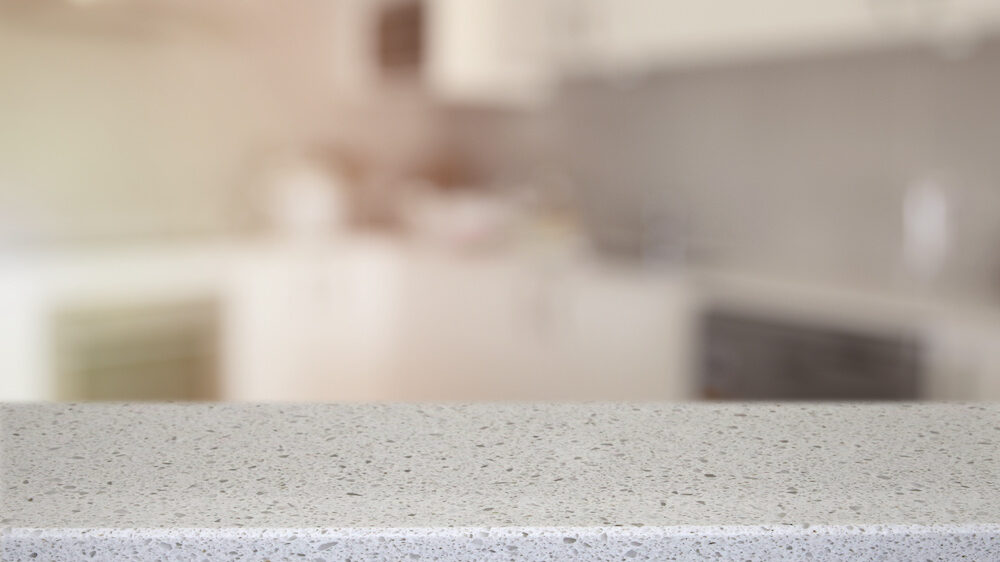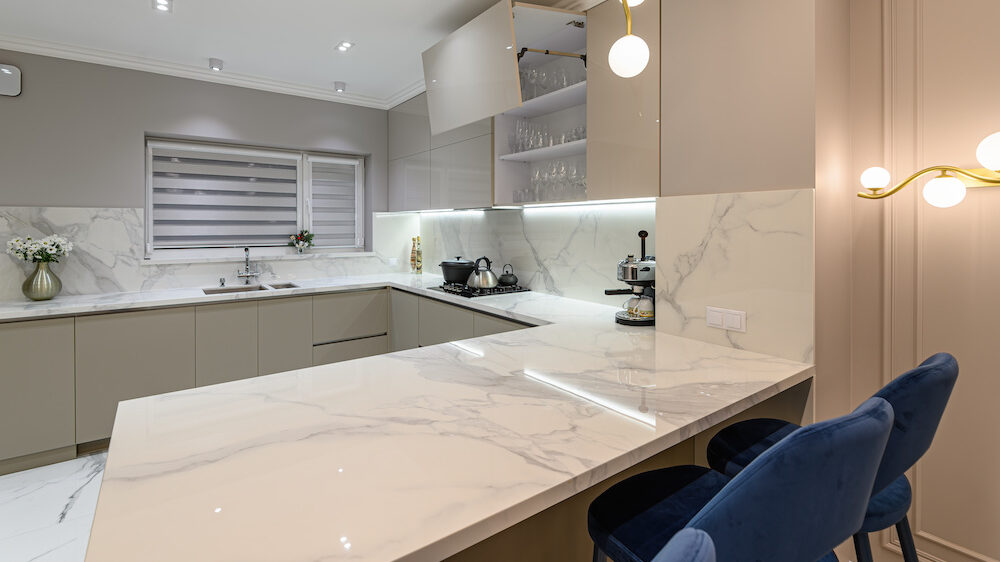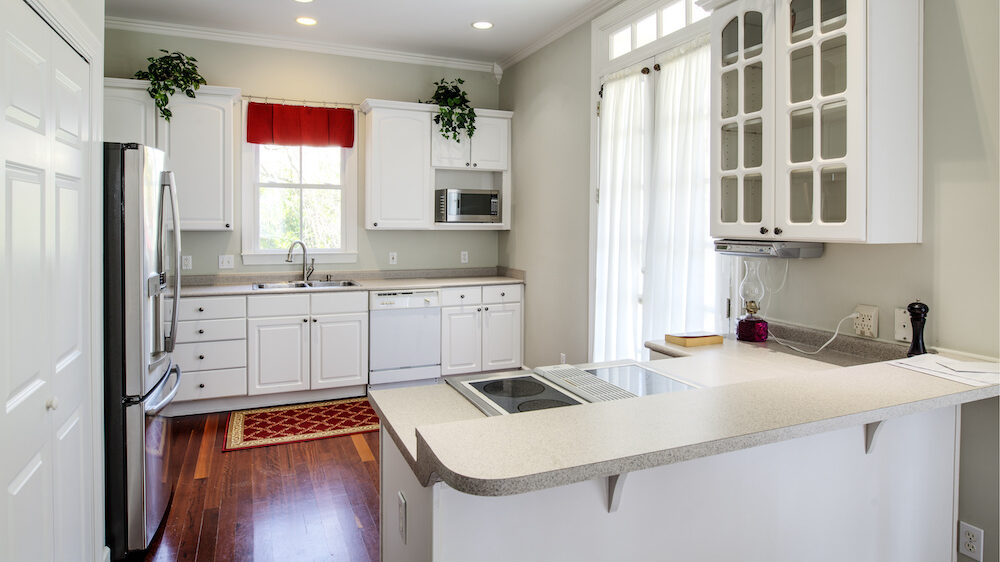What’s the best type of countertop? To homeowners looking to update their kitchen or bathroom, this is a mountain of a question. There are many different materials you can choose from, each with their own upsides, downsides, and costs. To figure out which one makes the most sense for your home, you need to take a look at each option. In this post, we’ll break down 7 countertop types, list their pros and cons, and share just how much you can expect to spend on each one.
7 Countertop Types, Pros and Cons, and Prices
1. Concrete

Some people are surprised to learn about concrete countertops. They’re used to concrete in their foundation or sidewalk, but in their kitchen or bathroom? While it may sound strange at first, concrete countertops are becoming increasingly popular. These surfaces are eye-catching and incredibly customizable, but are very difficult to install properly.
Pros
- Low maintenance
- Eco-friendly; renewable resource
- Highly versatile
- Durable
- Design options — various thicknesses, colors, textures, and finishes are possible
Cons
- Can’t cut on it directly.
- Heavy! If you have old built-ins, your house or cabinets may not support it.
- Difficult to move
- Very few qualified fabricators
- Costly!
Cost range: $110 – $140+/sf
2. Granite

Granite is a natural stone made from interlocking minerals like quartz and feldspar. It is taken from a quarry, cut into thin slabs, polished, and fabricated into a countertop. Granite aficionados love its natural and unique look, but others fear it isn’t practical or durable.
Pros
- Don’t depreciate
- Unique look – one of a kind!
- Sanitary – bacterial contamination is not a problem
- Soap and water cleanup
- Can take the heat of a hot pan
Cons
- Non-uniform look
- Costly and labor-intensive install
- Can crack or chip with sharp impact
- Heavy tops may require additional structural support
- Not easily removed once installed
Cost range: $50-$110+/sf
3. Quartz

Unlike granite, quartz countertops are engineered in a factory. They are created from ground quartz and combined with resins and pigments into a material that mimics natural stone. Quartz countertops are designed to be durable, yet more flexible than granite.
Pros
- Wide range of colors
- Consistent color and patterning (what you see is what you get)
- Durable like concrete and granite but won’t chip as easily
- Resists staining
- Non-porous (Won’t harbor bacteria)
Cons
- Quartz countertops are a manufactured product so they are not unique to your home
- Thinner profile than most countertops
- Not as natural looking as real stone
- Heat sensitive (No hot pans or curling irons!)
Cost range: $85 – $120+/sf
4. Marble

Marble countertops add a bit of luxury to your kitchen or bathroom. They are made from a glimmering natural stone (the name “marble” means “shining stone”) that varies widely in color and veining.
Pros
- Absolutely beautiful coloring
- Cost-effective with the range of choices
- Heat resistant – but still must use caution
- Unique – your counters are like no other!
Cons
- Porous (Will harbor bacteria if not cleaned and sanitized properly)
- High maintenance and needs to be sealed professionally
- Can stain and discolor with foods and chemicals
- Soft (Scratchable)
Cost range: $60-$120+/sf
5. Solid Surface (Like Corian)
Solid surface countertops were first introduced in the 60’s with the creation of Corian, a surface designed to be non-porous and homogenous. That first brand was so popular, it’s often used to refer to all solid surface products (like Kleenex can be shorthand for all tissues). That’s not to say they’re perfect. This fully synthetic countertop type has its own list of pros and cons.
Pros
- Midrange pricing
- Huge selection
- Can imitate natural stone and other materials
- Can be resurfaced and patched/repaired at home
- Low porosity (Easy to sanitize and chemical resistant)
- Can be bent, molded, and curved
Cons
- Can be scratched, cracked, and chipped
- Heat sensitive (Heat can deform the surface)
- Patterning is usually limited to particulate or solid colors and may require a lot of working to get more extreme designs
Cost range: $50-$110+/sf
6. Laminate

Laminate is the most budget friendly countertop type. These countertops are made from layers of plastic and are therefore lightweight. No one would suggest they can replace natural stone or even quartz, but laminate countertops have improved over the years and are available in a wide variety of designs.
Pros
- Inexpensive
- Millions of choices
- Textures available
- Custom thickness
- Can be installed in place and even over existing tops
- Low maintenance
- Can be installed without professional help
Cons
- Less durable than other tops (Can chip and crack)
- Seams are difficult to hide completely
- Shorter lifespan
- Water intrusion can ruin the entire counter
Cost range: $8-$50+/sf
7. Butcher Block

Unlike the other countertop types we’ve listed so far, butcher block countertops are made of wood. Homeowners have their pick of wood and wood grain, each with their own color and pattern. Generally they give a kitchen a warm, country tone. This option is cost-efficient but higher maintenance and less durable than other types.
Pros
- Very customizable
- Can be resurfaced in place by the homeowner
- Cost-effective with the right selection and care
- Can be installed without professional help
Cons
- Easy to scratch
- Very sensitive to chemicals and water
- High maintenance
- Can harbor bacteria
Cost range: $35-$250+/sf
Make Your Countertops Part of a Remodel
So far we’ve listed 7 countertop types and their pros and cons. But before you place any orders, consider making your countertops part of a larger remodel. This ensures that your kitchen or bathroom has a consistent flow and style. You’ll have more options when considering layout and can enjoy a completely new room. Otherwise one new feature can make others look even more outdated.
If you want help figuring out what countertop type is right for you, or want to see how a larger remodel can make the most of your new countertops, give us a call at VADA Contracting. We’ll help you love your space again.



